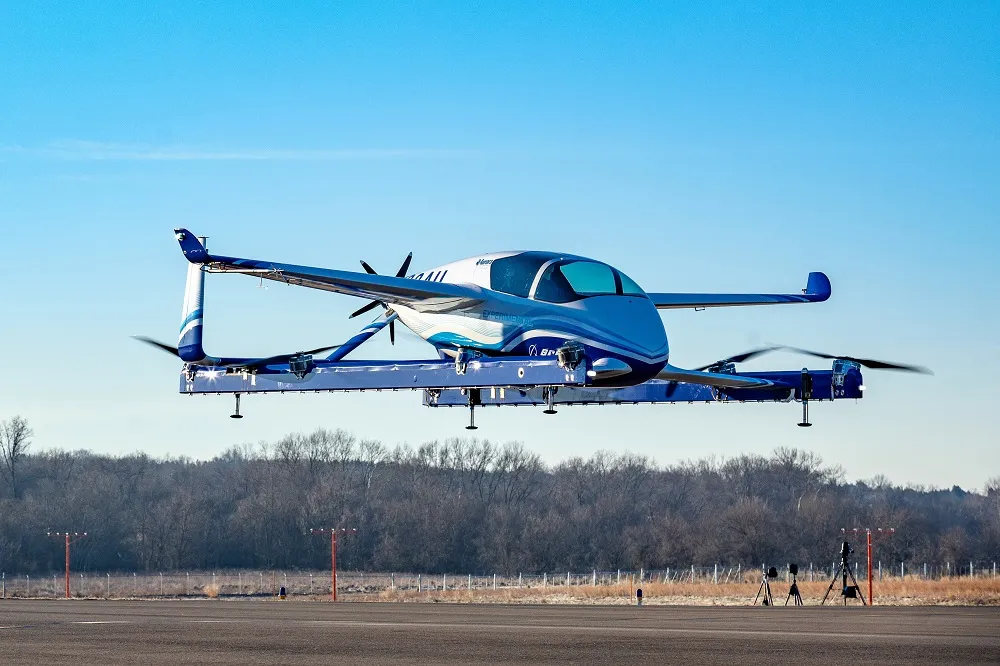
Boeing 'flying car' completes first test flight
Jan 23, 2019

Boeing's innovative flying car has successfully completed its first test flight, marking a significant milestone in urban air mobility. This prototype, designed to operate as both a drone and a personal transport vehicle, showcases advanced technology aimed at revolutionizing how people navigate congested city environments. The test flight demonstrated the vehicle's ability to take off, hover, and land autonomously, highlighting its potential for future applications in transportation. Boeing's venture into the flying car space reflects a growing interest in aerial vehicles as a solution to traffic congestion and urban mobility challenges, paving the way for a new era of transportation.
The Future of Urban Mobility: Boeing's Flying Car Test Flight
In a significant milestone for urban transportation, Boeing's innovative 'flying car' has successfully completed its first test flight. This development is not just a breakthrough for Boeing but also a leap forward for the entire aerospace industry, promising to transform how we navigate our cities. With growing concerns about traffic congestion and pollution, Boeing’s flying car represents a potential solution that could reshape urban mobility.
The Features of Boeing's Flying Car
Boeing's flying car boasts a range of impressive features designed to enhance safety and efficiency. Key specifications include:
| Feature | Description |
|---|---|
| Vertical Takeoff and Landing (VTOL) | Enables the vehicle to take off and land in compact spaces. |
| Electric Propulsion | Utilizes electric power for reduced emissions and noise. |
| Autonomous Navigation | Equipped with advanced AI for self-navigation. |
| Capacity | Designed to carry multiple passengers or cargo. |
These features not only position Boeing as a frontrunner in the flying car market but also highlight its commitment to sustainable aviation technologies.
The Significance of the Test Flight
The completion of the first test flight marks a crucial phase in Boeing's journey towards commercializing flying cars. This event showcases the potential for innovative transportation solutions that could alleviate urban traffic woes. The test flight allowed engineers to gather essential data regarding the aircraft's performance, stability, and overall operational capabilities.
Moreover, the successful test flight is a testament to Boeing's extensive research and development efforts in the aerospace sector. It indicates that the company is on track to meet its goal of launching a fully operational flying car service within the next decade. As cities continue to evolve, the demand for alternative transportation solutions is likely to increase, making this development particularly timely.
Challenges Ahead for Flying Cars
While the successful test flight is an encouraging sign, several challenges remain for the commercial viability of flying cars. Key challenges include:
- Regulatory Hurdles: Navigating the complex regulatory landscape will be crucial for Boeing. Ensuring compliance with aviation standards and securing necessary approvals from aviation authorities are vital steps in bringing flying cars to market.
- Infrastructure Development: The emergence of flying cars will require significant investments in new infrastructure, such as vertiports for takeoff and landing.
- Public Acceptance: Gaining the trust and acceptance of the public will be essential. Safety concerns and the perception of flying cars as a viable mode of transportation must be addressed.
These challenges will necessitate collaboration between Boeing, government entities, and urban planners to create a comprehensive framework that supports the integration of flying cars into existing transportation systems.
The Economic Impact of Flying Cars
The introduction of flying cars could have substantial economic implications. According to industry forecasts, the flying car market could reach billions in revenue by the next decade. The potential for job creation in areas such as manufacturing, maintenance, and infrastructure development is significant. Furthermore, flying cars could enhance productivity by reducing commute times, allowing individuals to spend more time in their professional and personal lives.
Conclusion: A New Era of Transportation
Boeing's successful test flight of its flying car marks a pivotal moment in the evolution of urban transportation. As technological advancements continue to reshape our world, the dream of flying cars is inching closer to reality. With the right investments in infrastructure, regulatory support, and public acceptance, Boeing’s flying car could revolutionize how we navigate and experience our cities.
As we look to the future, it is clear that innovations like Boeing's flying car will play a crucial role in addressing the challenges of urban mobility.
Stay tuned for more updates on this exciting development in the aerospace industry, and witness how flying cars could soon become a common sight in our skies.
Related Articles

Explore Thailand: The Best Islands to Visit for Paradise, Adventure, and Relaxation

The Ultimate Guide to the Best Islands in Thailand for Your Next Getaway

Do babies need passports? How to get a passport for a newborn

How to get a U.S. passport fast: here’s how to expedite the process

What is Mobile Passport Control: 5 reasons why you should use it

SENTRI vs. Global Entry: A detailed guide

Do you need a passport to go to the Bahamas? Let’s find out

Do you need a passport to go to Mexico? A detailed guide

Do you need a passport to go to Canada? We got the answer

Do You Need a Passport for a Cruise: An Essential Travel Guide

Booster Seat Requirements: All the Rules to Follow in Your Rental Car

What Are the World’s Most Powerful Passports, and How Does Yours Rank?

How to Take a Passport Photo at Home: A Helpful Guide

You've got to have heart! Southwest's new livery

Your opinion: Should water be free on low cost carriers?

Young women bolder than guys as solo travellers
